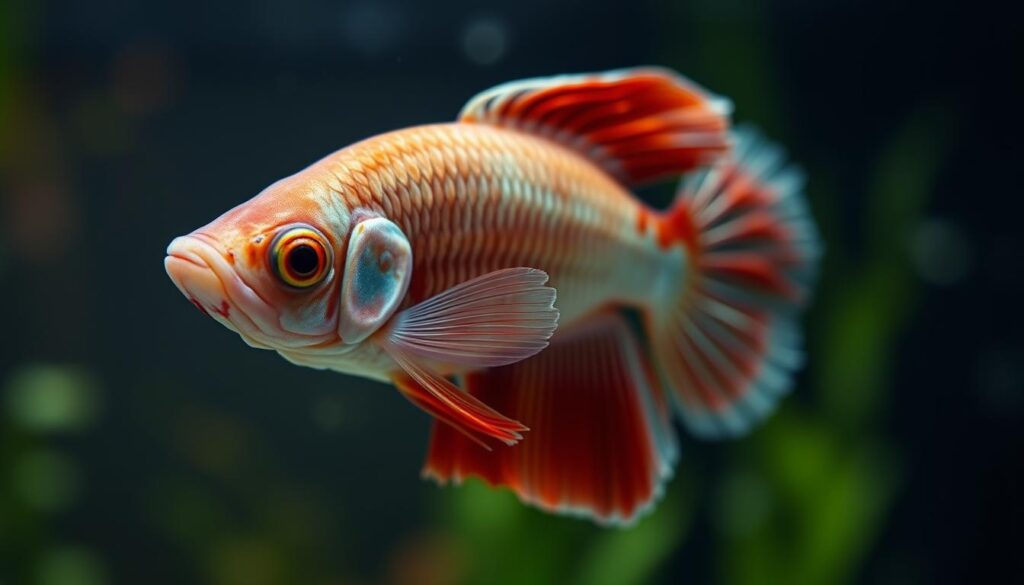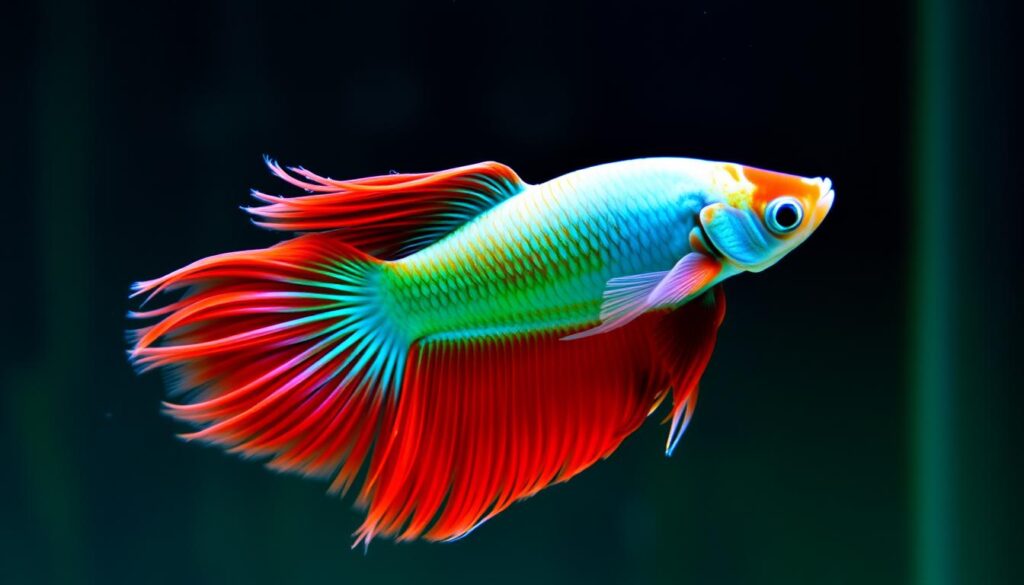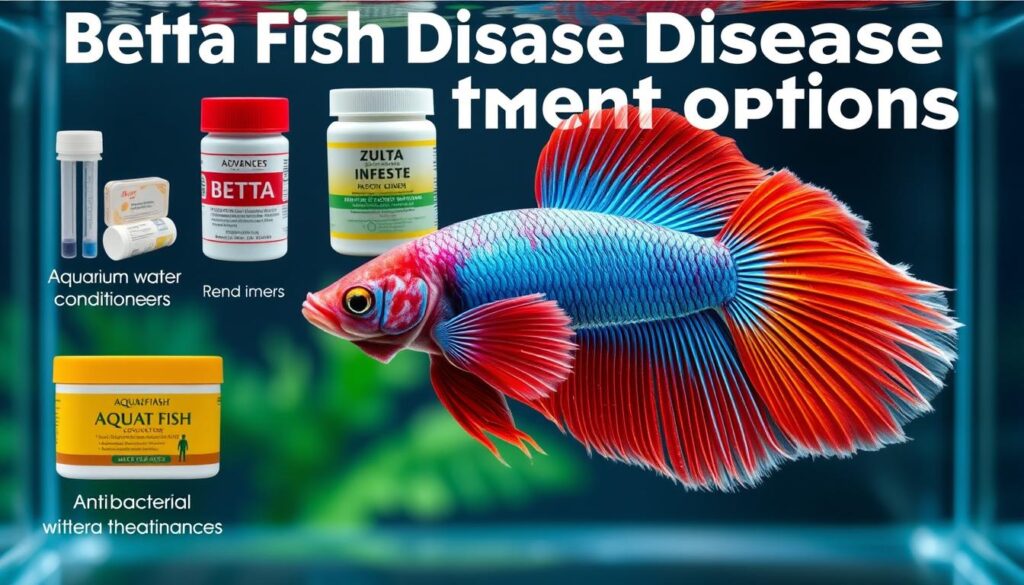Bacterial Infection in Betta Fish is a common but serious issue that can lead to fin rot, ulcers, and even death if left untreated. It is often caused by poor water quality, stress, or injuries. Early signs include lethargy, discoloration, and open sores. Prompt treatment with antibiotics and clean water conditions can help your betta recover quickly.
We can prevent illness by keeping water parameters right. This means ammonia and nitrite levels should be 0 ppm, and nitrates should be under 20 ppm. Regular water changes and watching the water can stop infections from spreading.
Betta fish often get sick from fungi and bacteria, and bad water is a big reason. About 70% of infections come from dirty or unfiltered water. Doing a 25-50% water change each week can make the water better and lower infection risks.
Key Takeaways
- Regular water changes can help prevent bacterial infections in betta fish
- Maintaining good water quality is crucial for preventing betta fish illness
- Treating betta fish infections requires a comprehensive approach, including antibiotics and water quality correction
- Betta fish are prone to infections caused by both fungal and bacterial pathogens
- Early recognition and treatment are key strategies in managing bacterial infections in betta fish
- Providing a balanced diet and reducing stress can help prevent bacterial infections in betta fish
Read Also How to Treat Velvet Disease in Betta Fish: A Quick Guide
Understanding Bacterial Infection in Betta Fish
Betta fish often face health problems, like bacterial infections. These can come from stress, bad water, or a weak immune system. It’s key to spot signs early, like being tired, not eating, and hard breathing. Knowing about these issues and how to prevent them is crucial for your betta’s health.
To stop bacterial infections, keep the water clean and the tank healthy. Regular water changes, a good diet, and a clean tank are essential. By doing these things, you can help your betta stay healthy and happy.
What Causes Bacterial Infections
Bacterial infections in betta fish happen when there’s too much bacteria or a weak immune system. Bad water, toxins, and chemicals can also cause infections. It’s important to clean up uneaten food and waste to prevent bacterial growth.
Common Types of Bacteria Affecting Bettas
Some common bacteria that affect betta fish include Columnaris, Dropsy, Fin Rot, and Ich/Ick. These can cause symptoms like white growths, swelling, and scale changes. Knowing about these issues and acting fast if you see them is crucial.
Why Bettas Are Susceptible to Infections
Betta fish are more likely to get infections because of their special needs and environment. Bad water, stress, and a weak immune system can lead to infections. By understanding these risks and taking steps to prevent them, you can keep your betta healthy.
| Common Bacterial Infections | Symptoms | Cause |
|---|---|---|
| Columnaris | Cottony white growths | Poor water quality |
| Dropsy | Extreme body swelling and pineconing of scales | Viral infections, poor nutrition |
| Fin Rot | Black/red tattered fin edges | Poor water quality, bacterial infections |
Early Warning Signs Your Betta Is Sick
As a betta fish owner, it’s key to spot early signs of illness. Betta fish illness can get worse fast. So, it’s vital to act quickly and treating betta fish infections effectively.
Watch for changes in appetite, lethargy, and labored breathing. These are common signs of illness. They mean your betta might need betta fish disease treatment options.
Look for signs like dull color, damaged fins, or swelling in the abdomen. These can mean your betta has a health issue. Also, a sudden drop in appetite or odd swimming can signal illness.
Read Also What Causes Dropsy in Betta Fish? Symptoms, Causes, and Effective Treatments
Some key early warning signs to watch for include:
- Changes in color or appearance
- Loss of appetite
- Lethargy or inactivity
- Labored breathing or gasping for air
- Swelling in the abdomen or enlarged eyes
By spotting these signs early and acting fast, you can stop infections from spreading. Make sure to check your betta’s water quality often. Adjust it as needed to keep your betta healthy.

Physical Symptoms of Bacterial Infections
As a betta fish owner, it’s key to know the signs of bacterial infections. These can include changes in how your fish looks, acts, and swims. White spots or patches on the body are a common sign.
Behavioral changes like being very tired or not wanting to eat can also mean a bacterial infection. It’s crucial to watch your betta fish’s behavior and look closely at its appearance to spot health problems early. Keeping your betta healthy means knowing these signs and acting fast.
 They might swim in circles or have trouble moving around. If you see these signs, get help right away. Antibiotics like Maracyn can help, but always follow a vet’s advice.
They might swim in circles or have trouble moving around. If you see these signs, get help right away. Antibiotics like Maracyn can help, but always follow a vet’s advice.
| Symptom | Description |
|---|---|
| White spots or patches | Common sign of bacterial infection |
| Lethargy or loss of appetite | Changes in behavior indicating potential health issues |
| Changes in swimming patterns | Erratic swimming or difficulty navigating surroundings |
How Water Quality Affects Bacterial Growth
As a betta fish owner, keeping the water quality good is key. This helps stop bacteria and infections. Bad water quality can lead to fungal and bacterial infections in betta fish. High levels of ammonia, nitrites, or nitrates can make infections worse.
To keep your betta fish healthy, aim for 0 ppm ammonia and nitrite levels. Nitrates should be under 20 ppm. Regular water changes, like 25–50%, can also help. Some experts suggest doing water changes daily when treating infections. Common betta fish health issues can be avoided by watching the water quality closely and making adjustments as needed.
Here are some tips for good water quality:
- Regular water changes (25–50%)
- Maintaining ammonia and nitrite levels at 0 ppm
- Keeping nitrates below 20 ppm
By following these tips, you can stopbacterial infections in betta fishand keep your pet healthy.

It’s also crucial to have betta fish disease treatment options ready if your fish gets sick. This might include antibiotics or antifungal treatments. You should also make changes to the fish’s environment to help it heal.
| Water Parameter | Recommended Level |
|---|---|
| Ammonia | 0 ppm |
| Nitrite | 0 ppm |
| Nitrate | Below 20 ppm |
Treating Bacterial Infection in Betta Fish
Acting fast is key when your betta fish gets sick. Bacterial infections are tough to beat, but the right steps can help. Using betta fish antibiotics is a crucial part of treatment.
There are many ways to treat your betta’s illness. Changing 50%-80% of the water can help. Also, antibiotics like Erythromycin or Tetracycline can fight internal infections.
Medication Options
Medicines like Mardel Maracyn, Aquarium Solutions Ich-X, and Fritz ParaCleanse can help. Use them as directed to avoid harming your fish. Always follow the instructions carefully.
Treatment Duration
Treatment time varies based on the infection’s severity. It usually lasts 7-14 days. Regular water changes and watching your fish are important. Finish the treatment as recommended to clear the infection.
Read Also How to Clean a Betta Fish Tank for Beginners
Recovery Signs
Keep a close eye on your betta during treatment. Look for signs like better appetite and more energy. With the right care, your fish can fully recover.
| Treatment Option | Effectiveness | Duration |
|---|---|---|
| Mardel Maracyn | 70% | 7-10 days |
| Aquarium Solutions Ich-X | 80% | 7-14 days |
| Fritz ParaCleanse | 90% | 10-14 days |
Natural Remedies and Supplementary Care
As a betta fish owner, it’s key to know that natural remedies are vital for betta fish disease prevention and recovery. Keeping the water clean is a top way to stop bacterial infections in betta fish. This means doing regular water changes, checking water levels, and feeding a balanced diet.
Some common betta fish health issues can be tackled with natural remedies. For instance, adding aquarium salt can help reduce stress and aid in healing. Also, a varied and nutritious diet can strengthen your betta’s immune system and ward off diseases.
Here are some natural remedies and care tips to keep your betta healthy:
- Perform regular water changes (10-25% every 2-4 weeks)
- Monitor water parameters (pH, ammonia, nitrite, and nitrate levels)
- Provide a balanced and varied diet
- Add aquarium salt to the water (1-2 teaspoons per gallon)
- Keep the tank clean and well-maintained
By following these tips and focusing on betta fish disease prevention, you can ensure your betta stays healthy and happy. Always watch your betta’s health and get vet help if you see any signs of illness or stress.
| Disease | Symptoms | Treatment |
|---|---|---|
| Popeye | Bulging eyes | Aquarium salt baths, antibiotics |
| Dropsy | Fluid retention, distended abdomen | Aquarium salt baths, antibiotics |
| Fin Rot | Frayed or torn fins | Aquarium salt baths, antibiotics |
Creating an Optimal Recovery Environment
When treating betta fish infections, setting up a recovery environment is key. You need a hospital tank of at least 10 liters. Keep the water temperature between 76℉ and 82℉. For some illnesses, like Ich and Velvet, you might need to raise the temperature to 30°C slowly.
Using betta fish antibiotics and other betta fish disease treatment options is important. But, always follow the dosage and administration guidelines to keep the fish safe. Also, carbon filters can remove medication from the water, making it less effective. So, it’s best to remove them during treatment.
- Water parameters: Regular water changes and good filtration are key for the best water conditions.
- Tank setup: Your hospital tank should have at least 10 liters and a stable temperature.
- Diet: A good diet, with high-quality pellets and live or frozen foods, can help prevent diseases in betta fish.
By following these tips and exploring treating betta fish infections options, you can help your betta fish recover. Always talk to a vet if you’re not sure about the best treatment.
Read Also Betta Fish Fin Rot? Here’s How to Treat It
| Disease | Treatment | Recovery Time |
|---|---|---|
| Fin Rot | 100% daily water changes, antibiotics | Varies |
| Dropsy | Antibiotics, quarantine | Varies |
| Popeye | Antibiotics, quarantine | Up to 7 days |
Prevention Strategies for Future Health
To keep your betta fish healthy, it’s key to have a daily routine. This includes changing the water, checking the water’s quality, and cleaning the tank. These steps help avoid bacterial infections in betta fish and other health problems.
A clean tank is important to stop infections from spreading. Here are some daily maintenance tips:
- Change at least 25% of the water every week.
- Keep an eye on the water’s pH, ammonia, and nitrite levels.
- Regularly clean the tank and decorations.
Watching your betta’s health over time is also crucial. This means:
Daily Observations
Watching your betta’s behavior, appetite, and health every day helps spot problems early. Being proactive helps keep your betta happy and healthy.
By following these steps, you can lower the chance of bacterial infections in betta fish and other health issues. This ensures your betta has a long, healthy life.
Conclusion: Ensuring Your Betta’s Long-term Health
Keeping our betta fish healthy is very important. We need to watch for signs of bacterial infections and keep the water clean. This helps our betta fish live a long, happy life.
bacterial infection in betta fish is common, but we can manage it. Watch your betta’s behavior and the water in their tank closely. If you’re not sure what to do, ask a vet or an aquarium expert.
Give your betta fish a clean home and good food. This helps their immune system and keeps them healthy. With a bit of care, our betta fish can bring us lots of joy.
Read Also How to Reduce Nitrates in Fish Tank: Methods for a Healthier Aquarium

